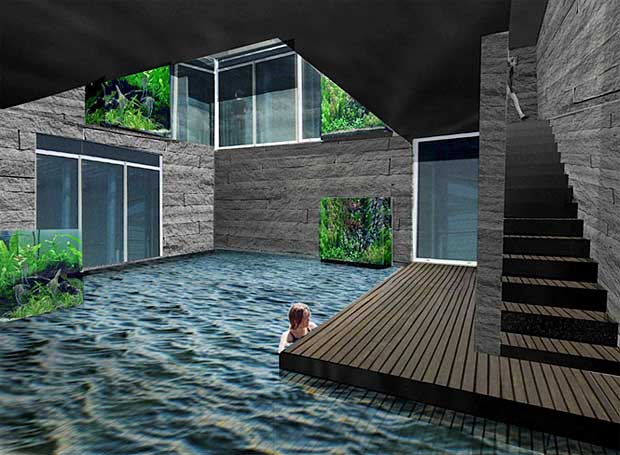Earth Home Advantages & Disadvantages
Living a Green life in an Eco-friendly earth home is an excellent
way you can decrease your effects on the planet, and there are
many styles from which to choose. If you're considering earth
homes, there are pros and cons of these homes in which you should
be aware.
Earth homes conserve energy. The average temperature in an underground
home in the United States is about 50-60 degrees F, in many areas.
This temperature is moderate enough that you won't have to use
a great deal of energy to keep your house comfortable.
If you live in a bermed home, you'll also be able to look outside
when you like, if you're not enamored at the prospect of living
completely underground. These homes, too, offer lower fuel bills,
since they have good energy conservation records.
An earth house is very secure, too, which will give you a higher
peace of mind, and there are minimal maintenance costs for the
exterior of your home, meaning you can save that money for a trip,
or something else you would enjoy.
In addition, your earth home will have an interior climate that
is comfortable at almost any time of year, so you won't be too
cold or too hot. Earth homes are also very quiet, since the ground
deadens and absorbs noise. This will give you peace and serenity.
Ridin' the Storm Out ...
Severe storms and tornadoes normally will not affect you when
you live in an underground earth home (with a periscope). You
are already in the safest place during a tornado. Obviously, you
would not build your earth home in an area that has frequent flooding,
or that would be a major disaster.

Some insurance companies give better rates to people with earth
homes, since they are so protected during times of dangerous weather,
and since they don't have as many flammable materials used in
their construction.
As far as the disadvantages of living in earth homes, you may
have less sunlight in your day, especially if your home doesn't
have windows. You can build your home just slightly above the
ground or install skylights, to help this problem.
You may also experience water that seeps into your living areas,
after heavy rains. This can be avoided by waterproofing your home.
You may want to look at installing two doors, since having only
one door is dangerous during a fire, as it may be the only means
of escape, and be blocked by fire.
The construction of earth homes may also be a disadvantage, too.
You'll also need to control the flow of water while your house
is being built, so that it is not compromised.

If you must move to another area, your earth home may be hard
to sell, since they don't appeal to everyone, and when a potential
buyer applies for a mortgage, there may be more hurdles for them
to clear, before they can be approved. This is largely due to
the fact that they don't have comparable statistics for earth
homes, since they are not conventional in their design.
Conclusion
As with any home, you'll find positives and negatives in purchasing
an earth home. Weigh the advantages and disadvantages and see
if an earth home is the right fit for you.
|

